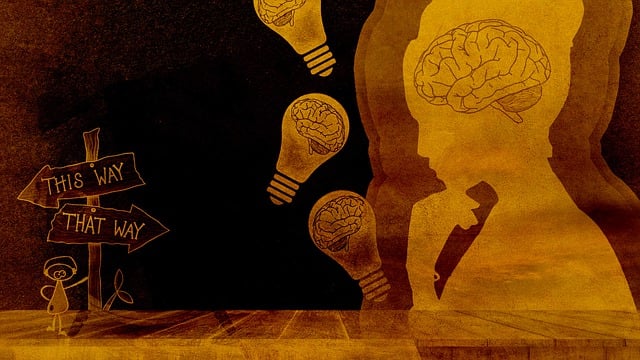Adolescence is a critical period where emotional development shapes teens' responses to trauma and loss, especially in cases of domestic violence. Specialized care focusing on resilience-building, healthy coping mechanisms, and mental wellness coaching is crucial. Therapeutic approaches like CBT, art therapy, and age-appropriate communication help teens process emotions, build strength, and develop effective coping strategies. Early intervention ensures adolescents receive tailored support to manage grief, cultivate resilience, and recover from domestic violence experiences.
Loss, grief, and bereavement can profoundly impact adolescent teens, especially those who have experienced domestic violence. This article explores these complex issues, providing insights into the unique challenges faced by young individuals navigating loss. We delve into the effects of domestic violence on mental health and present therapeutic approaches tailored for teen support. Additionally, we discuss strategies to empower adolescents in dealing with loss and finding healing, offering a comprehensive guide for understanding and addressing these critical topics.
- Understanding Loss, Grief, and Bereavement in Adolescents
- The Impact of Domestic Violence on Youth Mental Health
- Therapy Approaches for Teen Support During Difficult Times
- Empowering Teens to Navigate Loss and Find Healing
Understanding Loss, Grief, and Bereavement in Adolescents

Adolescence is a critical period marked by significant emotional and psychological development. When faced with loss, grief, or bereavement, teens may experience unique challenges due to their developmental stage. Understanding these feelings within this context requires specialized care, as the impact of domestic violence or any traumatic event can profoundly affect a young person’s mental health awareness. Therapy for adolescent teens goes beyond addressing symptoms; it aims to foster resilience and healthy coping mechanisms.
Grief is a natural response to loss, but when intense or prolonged, it may disrupt an adolescent’s ability to navigate their daily lives. Mental wellness coaching programs have been developed to support teens in processing their emotions, improving conflict resolution techniques, and enhancing their overall mental health. Recognizing the importance of early intervention, these programs provide a safe space for adolescents to express themselves, ensuring they receive the necessary tools to manage grief effectively and build resilience against future challenges.
The Impact of Domestic Violence on Youth Mental Health

Domestic violence has a profound impact on youth mental health, with adolescents and teens particularly vulnerable to its effects. Witnessing or experiencing abuse within the home can lead to a range of emotional and psychological challenges. Therapy for adolescent teens who have been exposed to domestic violence requires a sensitive and tailored approach. Cultural sensitivity in mental healthcare practice is essential, as it helps to create a safe and supportive environment for youth from diverse backgrounds. Empathy building strategies can foster strong therapeutic relationships, encouraging teens to share their experiences and work through trauma.
The consequences of domestic violence on young minds can be long-lasting, often manifesting as anxiety, depression, or even post-traumatic stress disorder (PTSD). Resilience building techniques are crucial in helping these individuals develop coping mechanisms and regain a sense of safety and control. Through specialized counseling, adolescents can process their emotions, understand the impact of domestic violence, and cultivate the strength to move forward in their lives.
Therapy Approaches for Teen Support During Difficult Times

When adolescent teens face challenging situations like domestic violence, therapy becomes a crucial tool for healing and support. Many counseling approaches have proven effective in helping young individuals process their emotions, build resilience, and navigate their experiences. One popular method is Cognitive Behavioral Therapy (CBT), which focuses on identifying and changing negative thought patterns related to the traumatic event. CBT empowers teens to manage their feelings and develop healthier coping mechanisms.
Additionally, expressive therapies like art therapy and journaling can be valuable for teen support during difficult times. Engaging in self-care practices such as mindful breathing exercises or keeping a mental wellness journal allows adolescents to externalize their emotions and gain perspective. Crisis intervention guidance is also essential, providing immediate strategies to help teens manage acute distress related to domestic violence. These therapeutic approaches collectively offer comprehensive care tailored to the unique needs of adolescent teens as they cope with grief and bereavement.
Empowering Teens to Navigate Loss and Find Healing

Loss, grief, and bereavement can be especially challenging for teenagers navigating their emotions during a time when self-discovery and identity formation are already paramount. Empowering teens to cope with loss requires specialized approaches that take into account both their developmental stage and unique experiences. Therapy for adolescent teens, particularly those who have been exposed to domestic violence, needs to be safe spaces where they can express their feelings without judgment.
Effective counseling involves communication strategies tailored to the teen’s age and understanding, fostering open dialogue about their loss and healing process. Cultural sensitivity in mental healthcare practice is crucial, recognizing that different cultural backgrounds may influence how teens process grief. Trauma support services that address both the individual and systemic causes of trauma can help adolescents find resilience and hope, enabling them to navigate these challenging times with enhanced coping mechanisms.
Loss, grief, and bereavement can profoundly impact adolescent teens, especially those exposed to domestic violence. Understanding these complex emotions and providing appropriate support through targeted therapy is essential. By employing evidence-based approaches, therapists empower teens to navigate their losses, process their grief, and find healing. Addressing these issues early and effectively can significantly contribute to the resilience and well-being of young individuals, helping them overcome challenges and build a brighter future. Additionally, recognizing the unique experiences of adolescents facing domestic violence is crucial in tailoring therapeutic interventions for optimal support.








